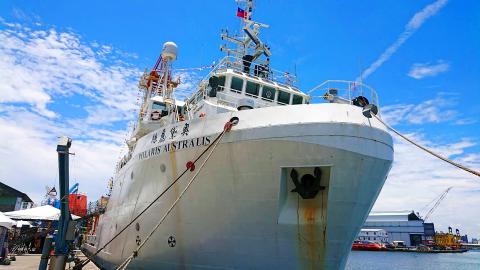Taiwan’s first locally designed and built drilling vessel, the Polaris Australis, was yesterday revealed at the National Kaohsiung University of Science and Technology’s Cijing campus.
Copenhagen Infrastructure Partners K/S (CIP) and Dragon Prince Hydro-Survey Enterprise Co (銓日儀) unveiled the vessel, which cost about NT$500 million (US$15.87 million) and was jointly funded by Dragon Prince and Pan Formosa Engineering Co (環島工程).
Dragon Prince said that construction of the vessel, which was designed by Jong Shyn Shipbuilding Co (中信造船), was completed at the end of last year.

Photo: Huang Pei-chun, Taipei Times
University vice president Yu Ker-wei (俞克維) said that the institute provided training to the vessel’s crew.
CIP Taiwan also provided training by foreign experts on several areas throughout the vessel’s construction, project office director Marina Hsu (許乃文) told the Taipei Times by telephone.
The training program spanned three months, and included courses on equipment calibration and dynamic positioning as well as health, safety and environmental regulations, Hsu said, adding that local companies often fail to conform to such requirements.
“This is a very special case,” Hsu said of the risk that the companies faced in building the vessel.
“Normally a company would start building a vessel once it has at least five orders,” Hsu said.
However, Dragon Prince and Pan Formosa launched the project even though they did not have a single order, she said.
CIP has placed an NT$80 million order with Pan Formosa to use the vessel in its drilling trials starting this month off Changhua County to install pipelines for its planned wind farms.
Local companies are willing to take risks by betting on the success of such projects, Hsu said, adding that the government should provide more support in areas such as finance and negotiations to accelerate the localization of the wind power industry supply chain.
The government has banned foreign vessels from drilling the seabed within the nation’s territorial waters, citing security concerns.

TAKING STOCK: A Taiwanese cookware firm in Vietnam urged customers to assess inventory or place orders early so shipments can reach the US while tariffs are paused Taiwanese businesses in Vietnam are exploring alternatives after the White House imposed a 46 percent import duty on Vietnamese goods, following US President Donald Trump’s announcement of “reciprocal” tariffs on the US’ trading partners. Lo Shih-liang (羅世良), chairman of Brico Industry Co (裕茂工業), a Taiwanese company that manufactures cast iron cookware and stove components in Vietnam, said that more than 40 percent of his business was tied to the US market, describing the constant US policy shifts as an emotional roller coaster. “I work during the day and stay up all night watching the news. I’ve been following US news until 3am

Six years ago, LVMH’s billionaire CEO Bernard Arnault and US President Donald Trump cut the blue ribbon on a factory in rural Texas that would make designer handbags for Louis Vuitton, one of the world’s best-known luxury brands. However, since the high-profile opening, the factory has faced a host of problems limiting production, 11 former Louis Vuitton employees said. The site has consistently ranked among the worst-performing for Louis Vuitton globally, “significantly” underperforming other facilities, said three former Louis Vuitton workers and a senior industry source, who cited internal rankings shared with staff. The plant’s problems — which have not

TARIFF CONCERNS: The chipmaker cited global uncertainty from US tariffs and a weakening economic outlook, but said its Singapore expansion remains on track Vanguard International Semiconductor Corp (世界先進), a foundry service provider specializing in producing power management and display driver chips, yesterday withdrew its full-year revenue projection of moderate growth for this year, as escalating US tariff tensions raised uncertainty and concern about a potential economic recession. The Hsinchu-based chipmaker in February said revenues this year would grow mildly from last year based on improving supply chain inventory levels and market demand. At the time, it also anticipated gradual quarter revenue growth. However, the US’ sweeping tariff policy has upended the industry’s supply chains and weakened economic prospects for the world economy, it said. “Now

COLLABORATION: Given Taiwan’s key position in global supply chains, the US firm is discussing strategies with local partners and clients to deal with global uncertainties Advanced Micro Devices Inc (AMD) yesterday said it is meeting with local ecosystem partners, including Taiwan Semiconductor Manufacturing Co (TSMC, 台積電), to discuss strategies, including long-term manufacturing, to navigate uncertainties such as US tariffs, as Taiwan occupies an important position in global supply chains. AMD chief executive officer Lisa Su (蘇姿丰) told reporters that Taiwan is an important part of the chip designer’s ecosystem and she is discussing with partners and customers in Taiwan to forge strong collaborations on different areas during this critical period. AMD has just become the first artificial-intelligence (AI) server chip customer of TSMC to utilize its advanced